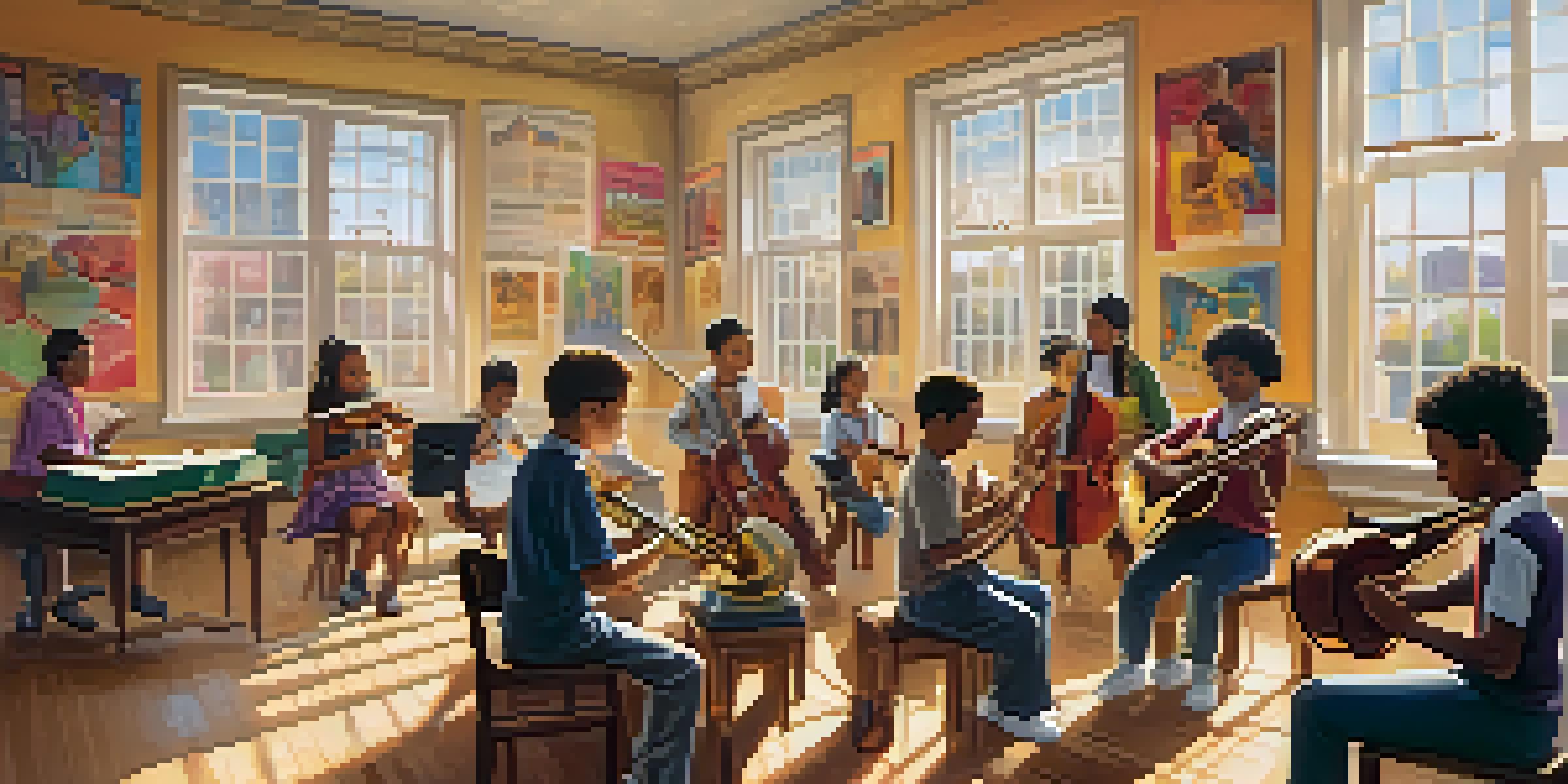The Role of Music Education in Developing Critical Thinking Skills

Understanding Critical Thinking and Its Importance
Critical thinking is the ability to analyze information and make reasoned decisions. It involves evaluating evidence, identifying biases, and considering various perspectives. In today's fast-paced world, these skills are crucial for problem-solving and effective communication.
Music can change the world because it can change people.
Many professions require strong critical thinking skills, from business to healthcare. As we navigate complex challenges, individuals who can think critically will stand out. This is where music education comes into play, offering an innovative approach to developing these essential skills.
By engaging with music, students learn to think deeply about composition, rhythm, and harmony. This process encourages them to question assumptions and explore different solutions, laying the groundwork for strong critical thinking abilities.
How Music Education Enhances Cognitive Development
Music education engages multiple areas of the brain, fostering cognitive development in students. When learning an instrument or participating in a choir, students must read music, coordinate physical movements, and listen critically. This multi-tasking helps to sharpen their mental faculties.

Research has shown that children who participate in music education often exhibit better memory and attention skills. As they practice, they develop patterns of thinking that extend beyond music into other areas of learning, creating a well-rounded cognitive framework.
Critical Thinking via Music Education
Engaging with music fosters critical thinking by encouraging students to analyze, evaluate, and explore diverse perspectives.
Moreover, music education encourages creativity, which is closely linked to critical thinking. By composing or improvising, students learn to evaluate their choices and adapt their ideas, enhancing their ability to think critically.
The Role of Collaboration in Music Education
Collaboration is a key component of music education, whether in band practice or group performances. Students learn to work together, communicate effectively, and resolve conflicts, which are all vital aspects of critical thinking. This teamwork fosters an environment where diverse ideas can flourish.
The beautiful thing about learning is that no one can take it away from you.
When students collaborate on musical projects, they must listen to one another, weigh different opinions, and come to a consensus. This experience teaches them to value different perspectives, an important aspect of critical thinking that applies in academic and real-world scenarios.
Additionally, collaboration in music education builds social skills and emotional intelligence. These qualities are essential for critical thinking, as they enable students to navigate complex social dynamics and make informed decisions within a group setting.
Music Education and Problem-Solving Skills
Learning music often involves overcoming challenges, whether it’s mastering a difficult piece or navigating complex rhythms. This process inherently develops problem-solving skills, as students must analyze their obstacles and devise strategies to overcome them.
For instance, when a student struggles with a particular note, they learn to break it down into smaller parts and practice repeatedly. This approach mirrors the critical thinking process, where larger problems are tackled by dissecting them into manageable pieces.
Collaboration Builds Essential Skills
Group activities in music education promote teamwork, communication, and conflict resolution, all vital for effective critical thinking.
Furthermore, music education encourages a growth mindset. Students come to understand that mistakes are part of the learning process, which fosters resilience and adaptability—key components of effective problem-solving.
Emotional Expression and Critical Thinking
Music is a powerful medium for emotional expression, allowing students to convey feelings that they might not articulate in words. This emotional engagement enhances their ability to think critically about their own experiences and those of others, fostering empathy.
When students analyze and interpret music, they explore the emotions behind the notes. This process encourages them to question the intent of the composer and the impact of the music on listeners, enhancing their ability to think critically about emotions and perspectives.
Moreover, understanding emotions in music helps students develop better self-awareness. This self-reflection is crucial for critical thinking, as it allows them to consider their own biases and assumptions before making decisions.
The Long-Term Benefits of Music Education
The benefits of music education extend far beyond the classroom. Studies indicate that students involved in music tend to perform better academically and excel in standardized tests. This academic success can often be attributed to the critical thinking skills honed through their musical experiences.
Moreover, individuals with music education often develop lifelong skills that serve them well in various careers. The ability to think critically, solve problems, and work collaboratively are traits highly valued in any profession, making music education an investment in their future.
Long-Term Academic Benefits
Students involved in music education often achieve better academic performance and develop valuable lifelong skills, including problem-solving and critical thinking.
Ultimately, music education equips students with a unique toolkit of skills that prepares them for the complexities of modern life. By fostering critical thinking, music education plays a vital role in shaping well-rounded, capable individuals.
Encouraging Music Education in Schools
Given the myriad benefits of music education, it’s essential to advocate for its inclusion in school curriculums. Parents, educators, and community members should work together to ensure that music programs are prioritized and adequately funded.
Advocacy can take many forms, from attending school board meetings to organizing community events showcasing student talent. By highlighting the positive impact of music education on critical thinking and overall development, we can encourage more schools to invest in these programs.

Additionally, offering workshops and resources for educators can help them integrate music into their teaching methods. By providing teachers with the tools they need to incorporate music, we can create a more enriching educational environment for all students.